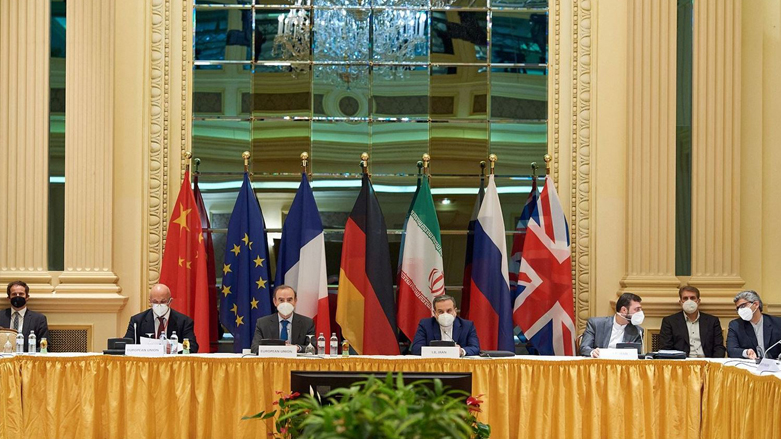US continues negotiations with Iran over nuclear deal, despite mounting criticism

WASHINGTON DC, United States (Kurdistan 24) –Late on Monday, Iran responded in writing to the “final” text of the European Union (EU)’s proposal for renewing the 2015 Iranian nuclear deal, which former President Donald Trump left in 2018.
The Biden administration has said that the time for negotiations on renewing the deal, formally known as the Joint Comprehensive Plan of Action (JCPOA), has ended, as the text of an agreement has existed since March.
Iran’s response to the EU’s latest proposal fell short of the unconditional acceptance that the Biden administration had been demanding. Nonetheless, it is continuing to discuss the issue with Iran through EU intermediaries
Despite mounting criticism, the Biden administration continues its efforts to reach such an agreement, which it insulates from other aspects of Iranian aggression. Most recently, that has come to include assassination plots within the US, which may even include the assault on Salman Rushdie.
Read More: Shi’a Extremist behind assault on Salman Rushdie
It also includes Iran’s support for Palestinian Islamic Jihad, which recently fought a brief battle with Israel, in which it fired nearly 1,200 rockets and missiles at the Jewish state. It also includes attacks by Iran and its proxies on the Kurdistan Region, particularly its energy infrastructure.
Whenever administration officials are pressed on their continued engagement with Iran, despite its aggressive behavior, their stock answer is that Iran’s aggression would be worse, if it had a nuclear bomb—oblivious to the counter-argument that if sanctions were lifted and Iranian assets unfrozen, it would reap billions of dollars, which would, most probably, increase Tehran’s belligerence.
Despite the Biden administration’s accommodating stance, obstacles to renewing the JCPOA remain, because Iran still wants changes to the “final” text.”
US Position: We’re Considering Our Response to Iran
State Department Spokesperson Ned Price told reporters on Tuesday that the EU had passed on Iran’s responses to its “final” proposal to Washington. “We’re in the process of studying them,” he said, and “at the same time,” we are engaged in consultations with the EU and our European allies on the way ahead.”
Price was pressed as to how his response was consistent with the administration’s established position that there was nothing left to negotiate. His answer was unclear, however.
“The big issues have been discussed,” Price responded, and “have been largely settled.” But pressed as to what outstanding issues were being discussed now, Price declined to do so.
Part of the issue involves the point that the JCPOA is not an ordinary agreement. That is why it has such a peculiar name. It is not a treaty, which would require Senate approval by a two-thirds majority. But it could not get such approval. Since it is not a treaty, it is not binding on future US administrations.
CNN reported that Iran wants to arrange a provision for compensation, if a future US president pulls out of the agreement. Several points, however, were not clear. They include whether the Biden administration could bind a future administration in that way. Moreover, if a future administration did decide to pull out of the agreement, why would Tehran expect it would pay compensation? How would such a provision be enforced?
Iranian officials have also indicated, according to CNN, that two other, undefined, issues remain to be resolved.
Growing US Criticism of JCPOA Negotiations
The Washington Post is a prestigious, centrist US newspaper. If anything, it leans Democratic, and its opinions are the kind of views to which the Biden administration pays attention.
On Monday, the Post published an editorial cautioning against a hasty renewal of the JCPOA. “Iran is weighing a ‘final offer’ from the European Union that would revive a deal with the United States to abandon its nuclear weapons development,” the editors wrote. “It can’t work without building trust; instead, the Islamic republic seems intent on building tension.”
The editors were responding to the attempted assassination of the Indian-born author, Salman Rushdie, who has become a US citizen. They assume that, minimally, Rushdie’s US-born assailant, Hadi Matar, the son of immigrants from south Lebanon, was inspired by Iranian hardliners, if not “part of a wider pattern of Iranian-organized or-inspired terrorism on U.S. soil.”
That, however, is not the State Department position. Asked about the possible impact of the assassination plots, Price affirmed that the administration was “clear-eyed” about Iran’s “malign influence,” but if it were to acquire nuclear weapons, “every challenge we face with Iran” would be “more difficult to confront.”
In addition, Senators Robert Menendez (D, New Jersey) and James Risch (R, Oklahoma), the top Democrat and top Republican on the Senate Foreign Relations Committee released on Monday a strongly worded appeal to the State Department to take meaningful action to protect the Kurdistan Region from pressure being exerted by Tehran in concert with pro-Iranian elements in Baghdad.
“We urge you immediately to engage at a high level with the KRG [Kurdistan Regional Government] and the Iraqi government to safeguard the economic stability of the KRI [Kurdistan Region of Iraq],” they wrote US Secretary of State, Antony Blinken.
